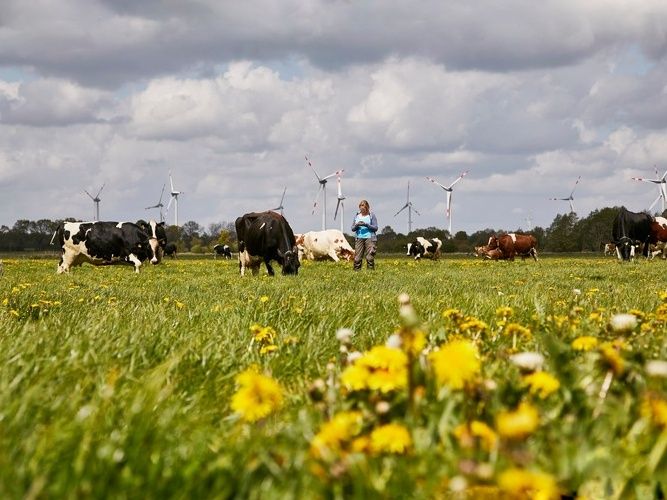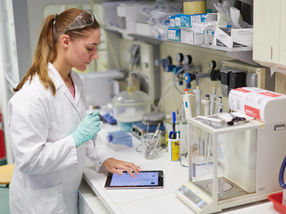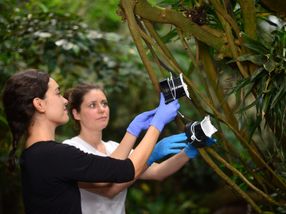Arla Balance 2022
Stable performance and important sustainability measures in another volatile year
European dairy cooperative Arla Foods has effectively managed the inflationary environment of 2022. For example, Arla managed a good performance with a significant increase in the monthly milk price and a scheduled back payment of 2.2 euro cents per kilogram of milk delivered to Arla farmers for the full year. Arla has also made important steps in sustainability: emissions in Scope 1, 2 & 3 have decreased and a new incentive model for sustainability on Arla farms has been successfully developed. Arla's German business in 2022 was also impacted by the high level of inflation with rising prices and the accompanying high pressure on the cost side. This also required corresponding price increases in this country, both in the branded and private label businesses, in order to cover some of the increased costs on Arla dairy farmers' farms and in the dairies. In Germany, the company is among the top 5 in the dairy industry, with two large dairy plants in Rhineland-Palatinate and Mecklenburg-Western Pomerania, as well as its German headquarters in Düsseldorf and more than 1,400 German cooperative members. In the local retail market, Arla is represented by brands such as Arla Buko, Arla Skyr and Arla Kærgården, as well as private labels.

Arla
Total sales of the Arla Group increased by 23.2 percent year-on-year to €13.8 billion in 2022 (2021: €11.2 billion). The sales growth is almost exclusively attributable to higher prices. Stagnant supply and constant demand led to an increase in raw material and retail prices, which had a positive impact on the sales growth. Arla achieved a net profit of 382 million euros, or 2.8 percent of sales, for cooperative members last year, which is at the lower end of the target range of 2.8 to 3.2 percent of sales. The profit was driven by unprecedented high margins on commodity products, which, together with high production costs, put pressure on margins in the retail and foodservice businesses.
The financial result enabled the Arla Board to propose an additional payment to dairy farmers totaling 2.2 euro cents (including interest on capital contributions) per kilogram of milk delivered in 2022. This amount will be paid in two installments for the first time under the new consolidation policy; 1st installment already in September 2022 and 2nd installment in March 2023.
The average milk price paid by Arla to its farmers across Europe increased by 40.5 percent in 2022 compared to the previous year, rising from 37.0 euro cents per kilogram of milk (2021) to 52.0 euro cents per kilogram of milk in 2022 (average price for conventional and organic milk in all seven, European Arla producing countries). In Germany, the Arla milk price for conventional milk averaged 50.90 euro cents in 2022 (vs. 36.31 euro cents in 2021); prices in each case exclude the scheduled annual additional payment and annual capital contribution.
The higher returns on milk money helped alleviate pressure on farmers, who faced significantly rising production costs as prices for feed, fertilizer and energy reached unprecedented levels. It also helped them make the investments needed to continue the transition to more sustainable dairy production and meet Arla's goal of reducing CO2e emissions on farms by 30 percent per kilogram of milk by 2030.
"The year 2022 was marked by inflation and uncertainty for our farmers and for our company. Despite this challenging environment, we achieved stable results while making important progress on sustainability. As a cooperative, we took a historic step in 2022 with the decision to introduce a sustainability incentive that links portions of each farmer's milk price to sustainability activities and performance. Under the incentive model, a total of up to 500 million euros will be redistributed each year, which clearly demonstrates our ambition to be at the forefront of a progressive dairy industry," says Jan Toft Nørgaard, Chairman of the Supervisory Board of the Arla dairy cooperative and a Danish farmer.
Brand growth slowed by shift to cheaper products and consumer decline: after two years of above-average brand growth in the Corona pandemic, volume-based sales growth through brands slowed again in 2022; the increased cost of living put consumers and value chains under increasing pressure. The sharp decline in purchasing power meant that consumers in Europe and Africa in particular not only increasingly turned to cheaper products, but also bought fewer dairy products overall. At the end of 2022, demand for dairy products in Europe was around five percent lower compared to demand at the end of 2021.
"The drastic increase in the cost of living has impacted our business globally and our brands in particular. While they continue to be a key value driver of our business, volume in the branded segment has declined by 3.2 percent. Some exceptions were our foodservice brand Arla Pro, Arla Protein and our Starbucks business, which all showed positive growth rates. Our international business also grew with the Puck brand performing well in the Middle East," said Peder Tuborgh, Group CEO of Arla Foods.
Business areas under inflationary pressure:
Arla divides its business into four divisions.
Arla Europe business: historically high inflation led to significant price increases in Arla's Europe business. Sales revenue increased by 17.4 percent to €7.77 billion (2021: €6.62 billion). Volume-based sales growth (volume) with brands was down, at -4.2 percent, as consumers shifted to lower-priced product options and increasingly took advantage of special offers. Some product categories and brands experienced significant volume declines, with the strongest impact in the butter and blended spreads category, with a volume decline of -7.0 percent. Despite these challenges, Arla achieved volume-based brand growth in the Netherlands/France/
Belgium business area achieved volume-based brand growth of 1.3 percent. The Starbucks licensed brand (milk-based chilled coffee beverages) achieved volume-based sales growth of 14.4 percent in the Europe business area, Arla Pro increased by 20.4 percent and Arla Protein by 48.1 percent.
The German business, as part of the Europe business area, was equally affected in 2022 by the high level of inflation with rising prices and the accompanying high pressure on the cost side. This also necessitated corresponding price increases in this country, both in the branded and private label business, in order to be able to cover some of the increased costs on the farms of Arla dairy farmers and in the dairies.
Focus on sustainability in Germany, even in challenging times: In line with Arla's ambitious climate agenda - from farm to chiller cabinet - sustainability was also a focus at Arla Germany last year. On the one hand, the new Arla Organic Standard was introduced at the beginning of the year; with numerous new elements in the areas of soil health, biodiversity, climate and animal welfare. On the other hand, emissions data (CO2e) were collected on Arla farmers' farms as part of the third round of Arla Climate Checks. The Climate Check is a key element in achieving Arla's climate targets. Arla now has a unique database with extensive emissions data from the dairy industry, on the basis of which dairy farmers can take targeted measures to reduce CO2e. In addition, an extensive umbrella brand campaign was launched in the fall, with a strong focus on sustainability. The fact that Arla has taken a positive path with its climate strategy was also demonstrated by its nomination as a finalist (Transformation Field Climate) at the prestigious German Sustainability Award (DNP) at the end of last year. "We want to make the dairy industry more sustainable and are leading the way with our farmers. After all, milk is one of the most valuable foods and offers a high nutritional content with high-quality protein, very important vitamins, minerals and carbohydrates. Being selected as a finalist in the German Sustainability Award as the only dairy company was both a great recognition and an incentive to take the lead in shaping the future of a more sustainable dairy industry," says Lillie Li Valeur, Head of Germany at Arla Foods.
Arla LactoFREE & Starbucks chilled coffee drinks continue to present themselves strongly in the German market: due to high inflation levels, German consumers also showed lower demand in the dairy category, especially in the second half of the year. In addition, consumers increasingly turned to private labels and less frequently to branded products. This overall trend was also evident at Arla Deutschlang, resulting in a decline in sales (volume) across Arla Germany's branded business. However, Arla's business fared somewhat better than the overall German market, as the dairy cooperative is well represented in both its branded and private label businesses in this country. In Arla's branded business, two brands in particular proved very strong, bucking the general market trend and posting double-digit percentage growth in sales. One of these was the Arla LactoFREE brand, which grew as a result of portfolio expansion and increased distribution of its milk drinks. This is because more and more people are turning to lactose-free dairy products. The other was milk-based chilled coffee drinks from Arla's licensed Starbucks brand, which grew again in 2022 after strong sales growth in 202.
Looking ahead to the current year, Lillie Li Valeur notes, "In the German market, we expect another volatile year with high cost pressure. Despite a challenging market environment, we will continue to have a strong focus on our brands and consistently pursue the topic of sustainability; both along our entire value chain as well as in our marketing measures and at product level. One particular highlight: our new fresh milk Arla Æ.K.T - Active for Climate and Animal Welfare is coming to the first supermarkets these days; an innovative product that clearly demonstrates our goals and actions in the areas of climate and animal welfare."
Arla International business unit: in this business unit, sales increased by 17.2 percent to EUR 2.46 billion (2021: EUR 2.10 billion). This development was mainly due to price increases required to offset higher production costs. Overall, volume in the branded business declined and was -1.2 percent, but in the Middle East & Africa and Southeast Asia regions, Arla posted record brand volume growth of 4.3 percent and 21.3 percent, respectively. Business in China, on the other hand, was difficult throughout the year due to the strict Corona lockdown.
Arla Foods Ingredients (AFI) business: The wholly owned subsidiary of Arla increased its sales volume with value-added protein by 6.8 percent and sales by 29.5 percent to €1.03 billion (2021: €794 million). Strong demand for Arla AFI's specialized whey protein and lactose products secured margins in a very dynamic market environment with energy and raw material prices at record highs.
Global industrial sales business (B-B raw material sales): The total share of milk solids sold in Global Industrial Sales increased to 23.6 percent in 2022 from 22.1 percent in the previous year. The business area increased its sales by 45.2 percent to EUR 2.53 billion (2021: EUR 1.74 billion) due to higher raw material prices. Strong global industry sales were a key contributor to a competitive milk price to Arla's cooperative members.
Arla farms on track with CO2e reductions: Arla's emission reduction programs delivered expected reductions in 2022. Arla reduced Scope 1 & Scope 2 emissions (areas of production, own logistics fleet and energy use) by 4 percentage points in 2022. Compared to the 2015 baseline, this results in an overall reduction of 29 percent. Although the company continues to pursue its planned switch from fossil to renewable energy, gas supply risks in Europe necessitated a temporary switch to oil at individual production sites to ensure continuity of supply. Arla compensated for the associated increased emissions by purchasing additional certificates for electricity from renewable sources. In addition, Arla announced a new target of using 100 percent renewable electricity in Europe by the end of 2025 through the agreement of additional so-called Power Purchase Agreements (PPAs; special, long-term electricity supply contracts).
Arla's Scope 3 emissions (Arla farms per kg of milk in this case) were reduced by 2 percentage points per kg of milk and whey and by 9 percent overall compared to the 2015 baseline. In 2022, Arla also took steps to further accelerate Scope 3 emissions reductions on farms with the development of a sustainability incentive model. It links parts of the milk price that farmers receive to sustainability measures on farms. Under the incentive model, which will start paying out in August 2023, dairy farmers can receive a total of up to 3.0 euro cents per kilogram of milk for their sustainability measures that help achieve the 2030 target of -30 percent per kilogram of milk and whey in Scope 3 CO2e emissions. In addition, other sustainability measures, such as promoting biodiversity, are also included in the incentive model.
To reward sustainability measures to date and motivate further environmental improvements on farms, the Arla Board of Directors foresees up to €500 million of the milk money to be redistributed to farmers annually based on the individual score collected under the sustainability incentive model.
Outlook 2023:
Arla expects high inflation and volatility to continue to impact the business in 2023. Says Group CEO Peder Tuborgh: "2023 will undoubtedly be another challenging year as the challenging economic environment around the world and the ongoing impact of the war in Ukraine continue to affect the energy market and supply chains. Currently, we are seeing some easing of cost pressures on farms. As a result, we expect the supply and demand balance in the dairy market to return during 2023. However, commodity prices have fallen sharply from the fourth quarter of 2022, and we expect a further decline in commodity markets in 2023. We also expect growth in the branded sector to slow, due to lower consumer purchasing power and fears of recession."
The dramatic rise in the cost of living, which is expected to continue to affect consumers in 2023, has led Arla to revise downward a key economic metric in its Future26 corporate strategy. While the majority of Future26 remains unchanged, Arla's ambitions for branded product growth have had to be adjusted. The economic impact is strongest in 2022 and 2023, and Arla expects a return to growth conditions from 2024. Based on these assumptions, Arla expects branded product volume to decline by -1.5 to -3.5 percent in 2023 and expects branded volume to grow again between 1 to 4 percent from 2024.
Arla Group's sales forecast for 2023 is between EUR 13.6 and 14.2 billion. Profit as a percentage of sales is expected to be in the range of 2.8 to 3.2 percent and efficiency gains will be 55 to 85 million euros. The gearing ratio is expected to be in the target range of 2.4 to 2.8. [1]
On February 23, 2023, Arla will publish its full financial and sustainability report for 2022.
Key figures of the Arla Group's 2022 annual results at a glance:
-
Arla Group sales: €13.8 billion (2021: €11.2 billion)
Profit share of sales: 2.8 percent, 382 million euros (2021: 3.0 percent, 332 million euros)
Volume-based sales growth strategic brands (volume): -3.2 percent (2021: 4.5 percent)
Debt-equity ratio: 3.0 (2021: 2.6)
Milk volume: 13.5 billion kg (2021: 13.6 billion kg)
Net efficiency gains: 101 million euros
Milk performance price: 55.1 eurocents/kg milk (2021: 39.7 eurocents/kg milk).
(The milk performance price for Arla Foods is defined as the prepaid milk price plus the net profit for the year divided by the total milk supply of the cooperative members. It measures the value added per kilogram of milk supplied by the cooperative members, including the annual additional payment and retained earnings in the form of individual and collective capital contribution, and is an important financial indicator for the dairy cooperative).
Note: This article has been translated using a computer system without human intervention. LUMITOS offers these automatic translations to present a wider range of current news. Since this article has been translated with automatic translation, it is possible that it contains errors in vocabulary, syntax or grammar. The original article in German can be found here.


























































